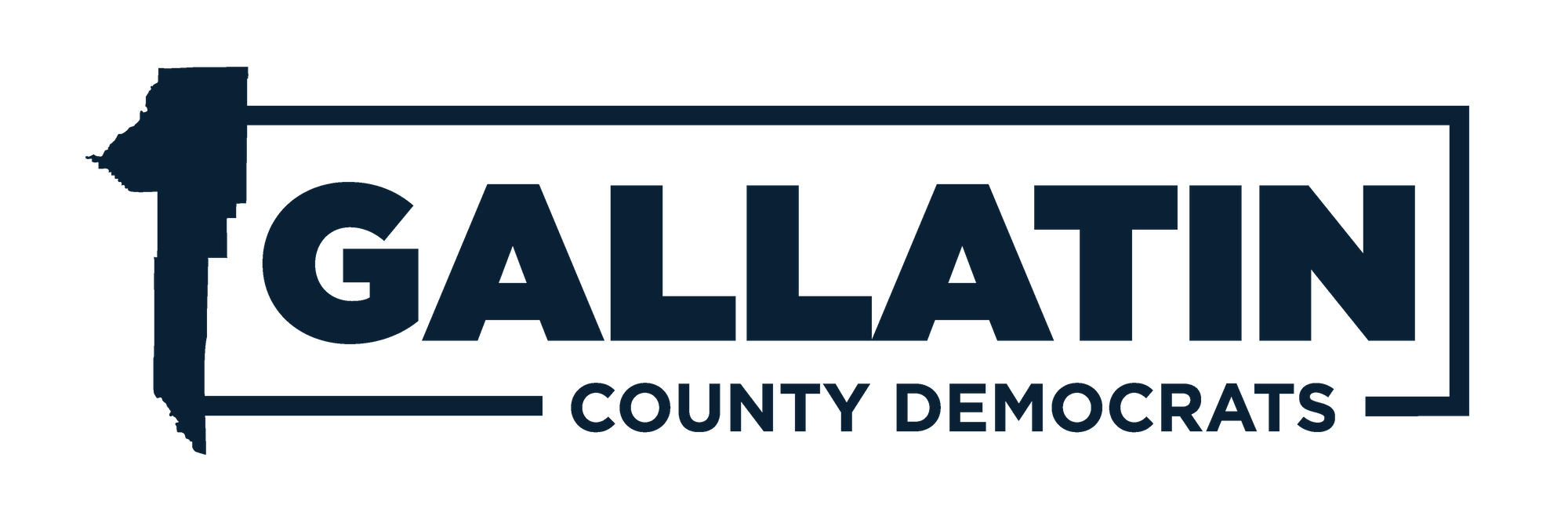

Gallatin Democrats Senator Cora Neumann (Senate District 30) and Representative Ed Stafman (House District 59).
Gallatin Senator Cora Neumann (SD30) and Representative Ed Stafman (HD59) recently discussed their views on Montana’s 69th Legislative Session. As we move into the backstretch of the State’s biennial policy-making, Sen Neumann highlighted these trends in the legislature:
Mid-Session Trends & Key Battles
As the Montana Legislature reached its mid-session transmittal break, lawmakers reflected on a session defined by judicial partisanship, Medicaid expansion, tax reform, housing policy, education funding, and ongoing culture wars. While Republicans maintain a strong majority, internal divisions—particularly in the Senate—have slowed or derailed some conservative priorities. Meanwhile, Democrats, who gained seats in 2024, have used their growing influence to push through bipartisan victories and block some of the most extreme measures.
Judicial Partisanship & Legislative Power Struggles
One of the most contentious battles this session has been over judicial reform, with Republicans making a concerted effort to politicize the judiciary. A bill requiring Montana judges to run in partisan elections (SB 42) advanced, despite opposition from legal experts, the Montana Supreme Court, and polling that shows a majority of Montanans oppose the change. Another measure (HB 39) allowing political parties to fund judicial candidates was signed into law, further undermining Montana’s long-standing nonpartisan judiciary.
At the same time, legislative attempts to give lawmakers more control over the courts and legal processes have had mixed success. Proposals aimed at limiting judicial review and increasing subpoena power stalled, revealing fractures within the GOP.
Healthcare & Medicaid: A Bipartisan Victory
One of the biggest bipartisan achievements was the renewal of Montana’s Medicaid expansion (HB 245), ensuring continued healthcare access for over 75,000 low-income Montanans. While some conservatives pushed to limit the program or impose stricter requirements, moderate Republicans joined Democrats to push the measure through, reflecting broad support from hospitals, businesses, and rural communities.
However, Republican lawmakers rejected proposals to expand access to reproductive healthcare, including measures that would have required insurance coverage for in-vitro fertilization and protected abortion access following the passage of CI-128 last year.
Housing & Workforce Affordability: Addressing Montana’s Housing Crisis
With housing affordability at the forefront of voter concerns, both parties prioritized property tax relief, though their approaches differed. Gov. Gianforte’s preferred plan (HB 231), which passed the House, aims to lower taxes on primary residences while raising taxes on second homes and short-term rentals. Meanwhile, Democratic alternatives (HB 154, HB 155) advanced as well, targeting tax relief toward lower-income homeowners and renters. [to note: HB 231 and 154 were voted down as of April 2, 2025].
Beyond tax relief, lawmakers also tackled housing affordability and workforce housing challenges. SB 172, sponsored by Sen. Dave Fern, expands the state’s resort tax law to allow an additional 1% tax for workforce housing initiatives. By increasing the population threshold for towns eligible for resort designation, the bill aims to fund more affordable housing projects in high-demand areas.
Democratic lawmakers have emphasized that Montana’s housing crisis has worsened under the current administration, with record-high rents, housing shortages, and increasing homelessness. Senate Minority Whip Susan Webber introduced companion bills addressing barriers to homeownership, particularly for Indigenous communities, noting that “what’s good for Indian Country is good for Montana.”
Meanwhile, efforts to increase housing supply through zoning reform also gained traction, with bills that require cities to allow fourplexes in more residential areas (SB 266) and reduce city-mandated parking requirements (HB 492) moving forward.
Education: Funding Wins & Controversial Policy Proposals
Education has been a major battleground, with bipartisan support for increased funding alongside sharp partisan divides over social policy.
Democrats and moderate Republicans pushed through key investments in public education, including the STARS Act (HB 252), which raises starting teacher pay through state-funded incentives. The bill is widely seen as a critical step in addressing Montana’s teacher shortage.
Additional bipartisan education priorities included:
- HB 567: expands school resource-sharing agreements to cut costs.
- HB 338 & HB 628: strengthen early literacy and math education programs.
However, conservatives have pushed to reshape public education through culture war-driven policies, including a controversial bill (SB 525) allowing schools to hire chaplains instead of counselors. While efforts to create tax credits for private education (HB 320) failed, the fight over public education funding and policy is likely to continue in the second half of the session.
Water, Environment & Wildlife: Major Deregulation Efforts
Montana Republicans have focused on loosening environmental regulations, while Democrats and conservation groups have worked to preserve protections.
Following the Held v. Montana youth climate ruling, lawmakers passed a bill (SB 221) requiring state agencies to inventory greenhouse gas emissions—but limited its scope by barring agencies from considering out-of-state fossil fuel impacts.
Other environmental bills weakened long-standing protections, including:
- HB 291: prevents the state from implementing air quality standards stricter than federal laws.
- HB 285: limits public challenges to development projects under Montana’s Environmental Policy Act (MEPA).
- HB 685: removes Montana’s long-standing “nondegradation” water quality standard, raising concerns about clean water protections.
Meanwhile, wildlife policy remains deeply polarized. HB 176, which passed, allows unlimited wolf hunting tags, while more aggressive efforts to extend wolf hunting seasons (HB 222) failed [to note: HB 176 failed on 3rd reading March 31, 2025].
Culture Wars & LGBTQ+ Rights: A Divided Outcome
Montana Republicans continued their push for laws restricting transgender rights, successfully passing:
- SB 164, which criminalizes gender-affirming care for minors.
- HB 121, which restricts public restroom access based on biological sex (headed to Gov. Gianforte’s desk) [to note: HB 121 was signed by the Governor on March 27 and blocked by a court April 2, 2025].
However, a bill attempting to ban same-sex marriage (SJ 15) and another restricting drag performances (HB 675) failed, as a coalition of moderate Republicans and Democrats blocked the most extreme proposals.
Labor Rights & Right-to-Work Defeated Again
In a major win for labor unions, right-to-work legislation (SB 376) was defeated, marking the third time this session that anti-union measures have failed. Meanwhile, a Democratic bill to raise Montana’s minimum wage was voted down along party lines, ensuring that economic policies will remain a key battleground for the remainder of the session.
Looking Ahead
With Medicaid expansion secured, judicial partisanship advancing, and ongoing fights over housing, education, and environmental policy, the second half of the session will determine how far Republicans can push their conservative agenda and where bipartisan coalitions will continue to hold the line.
While Democrats have leveraged their increased numbers to advance key policies on healthcare, housing, and teacher pay, Republican divisions in the Senate have created unexpected roadblocks to conservative priorities. These internal fractures within the GOP will likely shape Montana’s policy landscape moving forward, as lawmakers face growing pressure from their constituents on issues like affordability, education, and economic stability.
To track bills that affect our non-political judiciary, Senator Neumann suggested this bill tracking resource, which focuses on judicial autonomy, reform, and the separation of powers.
In addition the environmental, health, and renter’s protections, Rep Stafman discussed the State’s continued preemptive efforts, which prevents local municipalities from adopting small-scale policy to fit their constituents. On the session, Rep Stafman summarized:
On the environment, Republicans defeated several Democrat bills that would have protected our environment from harmful chemicals. HB 160, which sought to reverse the “ban on bans” was defeated, meaning that local governments cannot ban microplastics that are polluting our water and clogging our landfills. As a result, Bozeman’s plastics ordinance cannot go into effect. Also, Republicans defeated HB 290, which sought to follow the lead of many states by banning the sale of certain products containing PFAs, known as forever chemicals. These dangerous chemicals are everywhere and are linked to cancer and other diseases. Republicans also defeated HB 660, which sought to address greenhouse gasses.
On the consumer front, Democrats passed through the House HB 311, which requires landlords to return rental application fees to prospective tenants who do not end up getting the rental. However, Republicans defeated HB 273, which would have created safeguards against the unscrupulous collection of medical debt. Also, Republicans passed through the House at least five bills which protect out-of-state corporations and insurance companies from compensating Montanans when polluters pollute their land and water, when they’ve been exposed to asbestos or other dangerous products, or when they’ve been injured but the wrongdoing of a third party.
On healthcare, Democrats passed two bills on the House floor for continuous Medicaid eligibility. HB 386 makes it easier for adults to stay on Medicaid when they have a temporary change in their circumstances. HB 185 provides coverage to some 3,500 Montana children who qualify but are excluded from coverage due to red tape. Both of these bills are pending in House Appropriations.
On government transparency, Democrats passed HB 271 in the House, which closes loopholes in the public records law that allows the governor to withhold public records from the public.
On the immigration front, Republicans passed several laws authorizing Montana law enforcement to help ICE in identifying and deporting immigrants. However, Democrats defeated the worst of the bills, HB 709, which would have created draconian prison sentences and monetary penalties for anyone aiding an immigrant who they “should know” is not lawfully in the country, which would include a hospital providing medical care or a priest offering pastoral care. Also, Democrats passed through committee HB 275, which provides for driving privileges for immigrants lawfully in the country but who do not qualify for a driver’s license, though it has not yet come to the House floor.
Representative Stafman also pointed to Gallatin Senator Chris Pope’s bill SB 188, which lowers solar subscribers’ monthly power bills, enables solar power generated to directly enter electricity markets, and develops a framework to price solar energy. Sen Pope’s bill, which does not require state funding, enables interested consumers to invest in solar energy, expanding access to solar energy for Montanans.
Senator Dr. Cora Neumann (Senate District 30) is medical professional and freshman Gallatin legislator; Representative Dr. Ed Stafman (House District 59) spent 25 years in law then served Bozeman as its rabbi for a decade.

